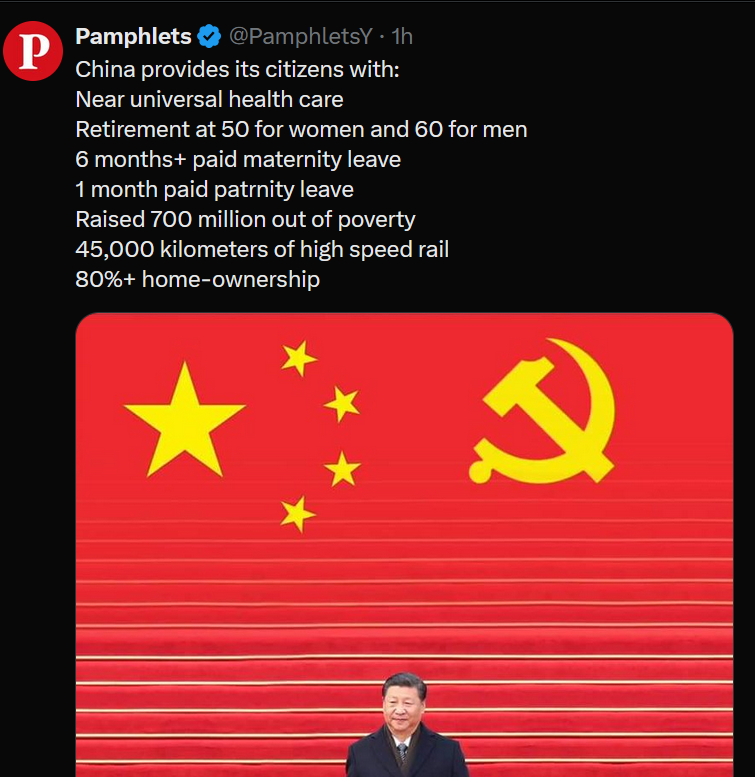
One theory I’ve heard about the accelerating of the worsening conditions of western proletariat is that the USSR used to provide a bulwark against things getting too bad. People would point at the USSR and the illusion that capitalism was better for individual prosperity would collapse in comparison. Then, with the USSR gone things have been deteriorating for the past ~30 years.
If that is true, even somewhat, why haven’t we seen a similar effect from China’s example? Is the theory simply wrong? Maybe western capitalism is just unable to even offer scraps from the table at this point. Maybe people are unaware of how things are in China? Could we dare to expect that China’s example will force a lifting of the boot from our necks?

Historical and material realities are not the same is what it boils down to.
The superstructure has changed which is part of it. End of history myth of the 90s, the idea that it’s only a matter of time until communist nations collapse, the feeling it has been discredited with the collapse of the USSR. The successful propaganda that paints China as a communist state but defines that as just authoritarianism and brutal exploitation of workers, that paints an image of China not as even a fake workers paradise where all are starving equally except the politiburo like the USSR but a land of slave labor, sweat shops, etc. So unlike the USSR there is this general feeling among the west that China is not a good place for workers, that it is really only a few steps removed from the imaged hell of the DPRK (North Korea) where everyone as all westerners know is interned in giant rock-breaking camps and works 18 hours a day before being fed some grass and dirt.
China opened up, they allowed the western bourgeoisie to move their Means of Production there and reap massive profits, they unlike the USSR allowed their people to be exploited in order to develop their productive forces. So the capitalists here point to that and say “well at least you’re not a Chinese sweatshop worker” while counting their profits. So there is a strange dependency and relationship of trade and profit there that the USSR never had with the west.
China’s foreign policy is also not like the USSR. The USSR’s policy was more aggressive, more interested in antagonizing the west, trying to export revolution, etc whereas China is more conciliatory.
China’s “successes” are hidden by propaganda. There’s no Sputnik moment here, no shock and terror that “the reds have the bomb too”. There is the established feel of US hegemony and unipolarity which people accept as given along with the end of history whereas at the end of WW2 the US was just cemented its status as leader of the capitalist world and the UK didn’t formally lose its status and prestige until the Suez crisis more than a decade later. It was a time of uncertainty and shifting powers.
At the end of WW2 European empires were put under the US boot. In exchange for invading from the west and preventing the Red Army from liberating western Europe they came under US control and the US sphere, their means of production destroyed but their colonies intact, their labor now cheap. This surplus of profits allowed enough excess for the bourgeoisie to feel comfortable incentivizing the western imperial core proletariat with good union jobs, benefits, even social democracy in those nations too close to the USSR.
One must also remember Europe was felt to be in danger. Gladio was undertaken because of a sense of a real threat. Most of the resistance movement in western Europe had been socialist in nature, they were still popular so concessions had to be made. Where concessions weren’t enough or not feasible dictatorships were installed such as Greece.
And one must remember the declining rate of profit. After WW2 lots of the MoP had been destroyed, a kind of reset for the decline, there has been no similar reset in the half century since.